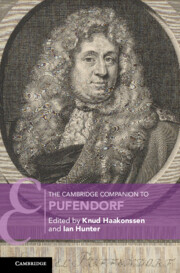Book contents
- The Cambridge Companion to Pufendorf
- Cambridge Companions to Law
- The Cambridge Companion to Pufendorf
- Copyright page
- Contents
- Contributors
- Abbreviations
- 1 Introduction: Life, Work and Historical Context
- 2 Politics and the Constitution of the Empire
- 3 Pufendorf’s Composite Method
- 4 The Metaphysics of Moral Entities
- 5 Human Nature, the State of Nature and Natural Law
- 6 Pacts, Language and Property
- 7 Family and Marriage
- 8 Pacts, Sovereignty and Forms of Government
- 9 The Civil Order: Law, Punishment and Social Value
- 10 The Law of Nations
- 11 Polemics and Controversies: Regarding the Eris Scandica
- 12 State, Church, Toleration, Reconciliation
- 13 Political Histories
- 14 Receptions, Contestations and Confusions
- Bibliography
- Index
7 - Family and Marriage
Published online by Cambridge University Press: 25 November 2022
- The Cambridge Companion to Pufendorf
- Cambridge Companions to Law
- The Cambridge Companion to Pufendorf
- Copyright page
- Contents
- Contributors
- Abbreviations
- 1 Introduction: Life, Work and Historical Context
- 2 Politics and the Constitution of the Empire
- 3 Pufendorf’s Composite Method
- 4 The Metaphysics of Moral Entities
- 5 Human Nature, the State of Nature and Natural Law
- 6 Pacts, Language and Property
- 7 Family and Marriage
- 8 Pacts, Sovereignty and Forms of Government
- 9 The Civil Order: Law, Punishment and Social Value
- 10 The Law of Nations
- 11 Polemics and Controversies: Regarding the Eris Scandica
- 12 State, Church, Toleration, Reconciliation
- 13 Political Histories
- 14 Receptions, Contestations and Confusions
- Bibliography
- Index
Summary
In his theory of the family, Pufendorf treats it as a complex society composed of three simple societies or associations: those between husband and wife (matrimony), parents and children (paternal society), and master and servant, or slave (societas herilis), which are united under the domestic rule of the paterfamilias, or head of the family. Given that Pufendorf holds all human beings – women no less than men – to be naturally equal in virtue of their humanity, that is, the common moral status that they acquire through their subjection to the law of nature, the question arises as to how he justifies authority in the private realm of the family: how does his patriarchal account of marriage, and his justification of servitude, or slavery, fit with the egalitarian premise of his natural law theory? In focusing on the role of pacts and consent in the founding of the various modes of domination within the family, the chapter highlights Pufendorf’s critical attitude to traditional justifications of authority, but also indicates the limits of the egalitarian premise of his natural law theory. The chapter ends with a comparison between the rule of the head of the family and supreme sovereignty in the state.
Keywords
- Type
- Chapter
- Information
- The Cambridge Companion to Pufendorf , pp. 164 - 189Publisher: Cambridge University PressPrint publication year: 2022

